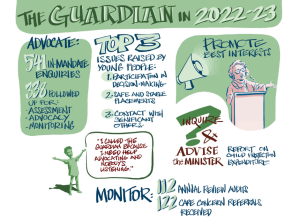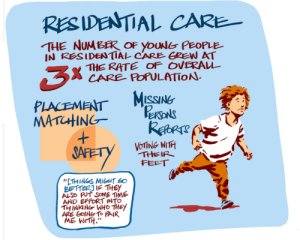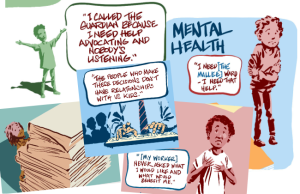 Over the past month, our weekly blog has explored the key findings from Shona’s annual reports for 2022-23.
Over the past month, our weekly blog has explored the key findings from Shona’s annual reports for 2022-23.
So far, we’ve covered her reporting as the Training Centre Visitor and Child and Young Person’s Visitor (about visiting and advocacy for young people in residential care and youth detention). This week, we take a look at her annual report as the Guardian for Children and Young People.
As the Guardian, Shona’s job is to advocate for the rights of all children under the guardianship of the Chief Executive of the Department for Child Protection – including those living in residential care, and in family-based care arrangements such as kinship and foster care. As Shona told us,
“In its simplest form, my role as Guardian is fundamentally dedicated to uplifting and amplifying the voices of children and young people in care. Whether children and young people live in family-based care, residential care or even in youth detention, these voices and their perspectives are integral in ensuring children and young people are growing up well and nurtured.”
The report shows that, in 2022-23 (and as in previous years), the most common issues people asked us for help about were the safety and stability of where children and young people in care live, their contact with people who matter to them and their involvement in the decisions (big and small) that affect their lives.
Noting the consistency of these same issues, which are raised year after year, the Guardian’s work in 2022-23 was firmly focused on looking forward to what needs to happen to achieve real change.
Safety in care

With this in mind, a key issue the report explored was how we’re applying lessons from the past – including some of the very important recommendations from the 2016 Child Protection Systems Royal Commission.
While many of these recommendations have been marked complete by DCP, the Guardian’s experience is that, for some recommendations, this is not the case. This includes those relating to children and young people under 10 being placed in residential care, rostering practices that make both carers and young people vulnerable, and children spending long periods with carers who haven’t been fully assessed.
“These recommendations were made to keep children in care safe,” Shona said.
“But they have not been fully implemented and, seven years later, we continue to see the same safety issues occurring.”
The report also looks at the potential for properly resourced therapeutic services to keep vulnerable young people in care safe. Following the release of her report, Shona has been speaking to media outlets about the importance of one such service – the Women and Children’s Health Network’s Intensive Therapeutic Care Program, operated by the Yarrow Place Rape and Sexual Assault Service. You can read more about what Shona has to say in her interview with the ABC.
 Connections in care
Connections in care
Children and young people consistently tell us that the connections in their life matter to them – whether that be with family, past carers, teachers, neighbours or other people who love and support them.
In 2022-23, we had a particular focus on relationships between siblings. Children have the right to know about their siblings and to have regular and meaningful connection with them. The Guardian has made a number of recommendations for law reform, to improve children’s access to their siblings. While these recommendations are being considered by government, Shona has initiated a project to identify practical barriers to sibling contact to better understand where and how systems need to change.
 For Aboriginal children and young people, Shona also highlighted the importance of making active efforts to apply the Aboriginal Child Placement Principle in all case management decisions, to support greater connection with family, community and culture. Shona is very much looking forward to Commissioner Lawrie’s final findings from her Inquiry into the Application of the Aboriginal and Torres Strait Islander Child Placement Principle in the Removal and Placement of Aboriginal Children in South Australia.
For Aboriginal children and young people, Shona also highlighted the importance of making active efforts to apply the Aboriginal Child Placement Principle in all case management decisions, to support greater connection with family, community and culture. Shona is very much looking forward to Commissioner Lawrie’s final findings from her Inquiry into the Application of the Aboriginal and Torres Strait Islander Child Placement Principle in the Removal and Placement of Aboriginal Children in South Australia.
“With one-in-eleven Aboriginal children and young people in South Australia living in out-of-home care, wellbeing for Aboriginal children is deeply connected to care experiences,” Shona said.
“Embracing the Aboriginal Child Placement Principle in its entirety – as a philosophy of care for Aboriginal children, not just as a hierarchical placement model – is key to improving wellbeing outcomes. That means we must rightly view culture as a protective factor for Aboriginal children and young people, and dispel the preconceived view that still exist which treat culture a risk factor”
 Listening to children and young people
Listening to children and young people
The Guardian’s report also has a strong focus on amplifying the voices of children and young people in care, and making sure they are included in decision-making about their own lives.
A big part of making sure that happens is giving young people access to necessary information and the opportunity to speak and express their views. But, even more important, is changing the attitudes and approaches of organisations that work with young people to be places where adults act on these views.
“In my role, I have the upmost privilege to see, hear, work with and for children and young people,” Shona said.
“They astound me with the clarity of their voices, the perspectives that they bring and the resoluteness they hold for natural justice. While they are growing, they of course need us to help them make decisions – but we should never doubt that they hold wisdom about their own lives and the world around them.”
The report highlights key recommendations made through the year to improve participation and inclusion in decision-making – which the Guardian will continue to advocate for, and work with government to achieve.
The full report is available on the Guardian’s website, as well as a visual summary. For more information about the report, you can contact us at gcyp@gcyp.sa.gov.au or on (08) 8226 8570.
